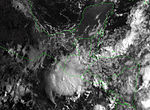1997 Pacific hurricane season
| 1997 Pacific hurricane season |

Season summary map
|
| Seasonal boundaries |
| First system formed |
June 1, 1997 |
| Last system dissipated |
December 6, 1997 |
| Strongest storm |
|
| Name |
Linda (Second most intense hurricane in the Pacific basin)
|
| • Maximum winds |
185 mph (295 km/h)
(1-minute sustained) |
| • Lowest pressure |
902 mbar (hPa; 26.64 inHg) |
| Seasonal statistics |
| Total depressions |
24 |
| Total storms |
19 |
| Hurricanes |
9 |
Major hurricanes
(Cat. 3+) |
7 |
| Total fatalities |
261-531 |
| Total damage |
$551 million (1997 USD) |
| Related articles |
|
|
Pacific hurricane seasons
1995, 1996, 1997, 1998, 1999
|
| Tropical storm (SSHWS) |
|
|
| Duration |
June 1 – June 7 |
| Peak intensity |
50 mph (85 km/h) (1-min) 998 mbar (hPa) |
| Tropical storm (SSHWS) |
|
|
| Duration |
June 9 – June 12 |
| Peak intensity |
45 mph (75 km/h) (1-min) 1002 mbar (hPa) |
| Tropical depression (SSHWS) |
|
|
| Duration |
June 21 – June 24 |
| Peak intensity |
35 mph (55 km/h) (1-min) 1006 mbar (hPa) |
| Tropical storm (SSHWS) |
|
|
| Duration |
June 25 – June 28 |
| Peak intensity |
50 mph (85 km/h) (1-min) 996 mbar (hPa) |
| Tropical depression (SSHWS) |
|
|
| Duration |
June 29 – July 4 |
| Peak intensity |
35 mph (55 km/h) (1-min) 1004 mbar (hPa) |
| Category 1 hurricane (SSHWS) |
|
|
| Duration |
July 5 – July 12 |
| Peak intensity |
90 mph (150 km/h) (1-min) 975 mbar (hPa) |
| Category 3 hurricane (SSHWS) |
|
|
| Duration |
July 12 – July 16 |
| Peak intensity |
115 mph (185 km/h) (1-min) 960 mbar (hPa) |
| Category 4 hurricane (SSHWS) |
|
|
| Duration |
July 14 – July 22 |
| Peak intensity |
130 mph (215 km/h) (1-min) 948 mbar (hPa) |
| Tropical depression (SSHWS) |
|
|
| Duration |
July 26 – July 27 |
| Peak intensity |
30 mph (45 km/h) (1-min) 1007 mbar (hPa) |
The 1997 Pacific hurricane season was a very active hurricane season. With hundreds of deaths and hundreds of millions of dollars in damage, this season was one of the costliest and deadliest Pacific hurricane seasons. This was due to the exceptionally strong 1997–98 El Niño event. The 1997 Pacific hurricane season officially started on May 15, 1997, in the eastern Pacific, and on June 1, 1997, in the central Pacific, and lasted until November 30, 1997. These dates conventionally delimit the period of each year when almost all tropical cyclones form in the northeastern Pacific Ocean.
Several storms impacted land. The first was Tropical Storm Andres which killed four people and left another two missing. In August, Tropical Storm Ignacio took an unusual path, and its extratropical remnants caused minor damage in the Pacific Northwest and California. Linda became the most intense east Pacific hurricane in recorded history. Although it never made landfall, it produced large surf in Southern California and as a result five people had to be rescued. Hurricane Nora caused flooding and damage in the Southwestern United States, while Olaf made two landfalls and caused eighteen deaths and several other people were reported missing. Hurricane Pauline killed several hundred people and caused record damage in southeastern Mexico. In addition, Super Typhoons Oliwa and Paka originated in the region before crossing the International Date Line and causing significant damage in the western Pacific. There were also two Category 5 hurricanes: Linda and Guillermo.
Activity in the season was above average. The season produced 17 named storms, which was a little above normal. The average number of named storms per year is 15. The 1997 season also had 9 hurricanes, compared to the average of 8. There were also 7 major hurricanes compared to the average of 4.
...
Wikipedia



















